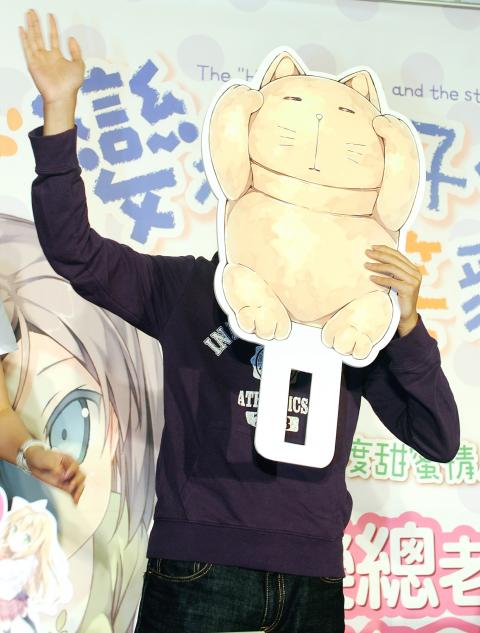After reading a Chinese translation of a Japanese light novel, a 22-year-old man from Taoyuan County, surnamed Wu, went on his blog to criticize the allegedly poor translation, reprehending it by saying that “anyone who reads this translation will go insane,” and telling the translator to give up his vocation immediately. After being informed of the situation, the translator, surnamed Huang, decided to take Wu to court. Wu was unable to read aloud from the original Japanese book during the hearing when the prosecutor asked him to do so, so the prosecutor said that he was not proficient enough in Japanese to ascertain whether the translation was accurate. On May 9, Wu was brought up on libel charges.
According to the prosecutor’s investigation, Wu purchased the second installment of The Hentai Prince and the Stony Cat, translated by Huang and published by Sharp Point Publishing. After reading the book, Wu went on a blogging Web site three times to post ill-intended comments that were highly critical of the translation for its alleged plethora of mistakes, saying that “the indiscriminate translation lacks any sense of unity,” and asking whether it was “translated using Google Translate.”
During the prosecutor’s investigation, Wu admitted that he had gone online to criticize the translation, claiming to have reached an intermediate reading level after studying Japanese for five years, and going on to point out 122 alleged mistakes in the translation, which caused him to feel dissatisfied with the experience of reading the book and subsequently go online to post the comments.

Photo: Yu Jui-jen, Liberty Times
照片:自由時報記者余瑞仁
(Liberty Times, Translated by Kyle Jeffcoat)
桃園縣二十二歲吳姓男子去年購買一本日本翻譯小說,閱讀後卻在部落格網站批評譯者亂翻譯,指摘「看那翻譯你絕對會瘋掉!」、「翻譯回家吃自己算了」等,黃姓譯者獲悉後提告,檢方當庭要吳男閱讀小說的日文原版,他卻無法朗讀。檢方認為,吳男的日文程度顯然無法判斷翻譯內容是否正確,五月九日將吳男依加重誹謗罪嫌起訴。
檢方調查,吳男去年四月間購買尖端出版社出版,黃姓譯者翻譯的日本小說《變態王子與不笑貓二》,閱讀後三度上網進入部落格網站,發表文章批評翻譯內容錯誤一堆,貼文指摘「亂翻沒有整體感就算了」、「是不是用Google翻譯的?」等非善意文章。

Photo: Liao Chen-hui, Liberty Times
照片:自由時報記者廖振輝
檢察官調查時,吳坦承上網批評這本小說的翻譯錯誤問題,表示自己接觸日文有五年時間,有一般的聽說讀寫程度,直指翻譯內容有一百二十二個錯誤,翻譯品質差,造成他閱讀的不愉快,才上網發表這些文章。
(自由時報記者余瑞仁、羅正明)

A: What types of fruit enzymes should we take to help reduce eye floaters? B: According to a study published in the “Applied Sciences” journal by Taiwanese ophthalmologist Horng Chi-ting, pineapple, papaya and fig supplements can improve symptoms. A: Pineapples are in season now, so you should munch on more of those to get rid of floaters. B: Not quite. Enzymes can be damaged by our stomach acid if we eat the fruit directly. The doctor says taking fruit enzyme capsules is better for absorption. A: Most importantly, we should reduce our use of personal electronics to prevent floaters from

Rice is essential to Japanese culture, tradition and politics. People take pride in the oval-shaped sticky Japonica grain, which is still a staple even though total consumption has fallen over the decades. But since last summer, prices have soared as supplies have fallen short of demand. The government has long paid farmers to cut back on rice acreage, and change to other crops to keep rice prices relatively high. To cope with shortfalls this year, the government has released rice reserves. But the grain has been slow to reach supermarket shelves. Anger over that was part of the reason the Agriculture Minister

In Taiwan, 7-Eleven convenience stores can be found on almost every street corner. With over 84,600 stores across 20 countries, 7-Eleven has more locations than any other retail business on Earth. For millions of people, the chain is an important part of daily life, providing coffee, quick meals, and essential items for those __1__. The history of 7-Eleven began nearly 100 years ago in Dallas, Texas. In 1927, the Southland Ice Company began selling blocks of ice that were used to keep fridges cool. Shortly after opening, the company __2__ its offerings to include groceries like milk, eggs, and

Continued from yesterday(延續自昨日) https://www.taipeitimes.com/News/lang In 1946, the company adopted the name 7-Eleven to reflect its newly extended __3__, from 7am to 11pm, a novel concept at the time. As a rapidly growing company, it began offering franchise opportunities in the 1960s. In 1974, the first 7-Eleven in Japan was opened by the supermarket company Ito-Yokado. The Japanese franchises were __4__ successful that by 1991, Ito-Yokado was able to acquire a 70 percent stake in Southland Corporation. Its investments eventually resulted in full ownership of 7-Eleven, which paved the way for the Japanese company to enter the international market. Since then, 7-Eleven